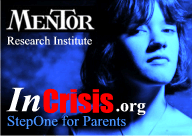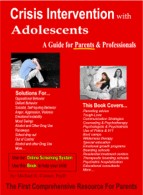By: Michael Conner, Psy.D
How A Teenage Crisis Can Develop There are hundreds of books written to help parents, families and teenagers in crisis. Day time talk shows expose a variety of issues on national television while "guest experts" provide "crisis interventions" in front of an audience. Self-help books are usually reasonable and factual, but they lack the personal and professional support necessary to get results. Parents read self-help books, but lack the support necessary to follow through and succeed. Day time talk shows are emotionally powerful and inspire parents and families to act, but they tend to simplify issues far too much. When parents do act, they can encounter avoidance, defensiveness, resistance and even hostility from their teenager. Parents become confused, give up, get frustrated or interact with their child in what amounts to a series of power struggles or conflicts. Parents may begin to turn on each other when they disagree about what should or should not be done. When parents disagree and argue about what to do, teenagers begin to believe that parents don't know what they are doing. Parents lose credibility when they disagree and teenagers form their own opinions when parents work in opposite directions. When parents seek help from mental health professionals, they may discover weeks or months later that health insurance does not cover the underlying problems that teenagers and families have. But, if the child can be diagnosed with depression or anxiety, then they will get to see a counselor or therapist for 6 to 8 sessions at 25 to 50 minutes per session. It is common place to find that therapists are not empowered to provide the level of service they know teenagers and families need. And for reasons that are not supported by research, insurance companies believe that 50 minutes a week with a counselor sitting in an office for 6 to 8 sessions can have a profound or lasting impact on a teenager who is in a crisis. Services authorized by insurance companies are increasingly brief and focus on symptom relief instead of the real problem. Antidepressants are prescribed for teenagers who are using marijuana. And stimulants like Dexedrine are prescribed for kids who are bored, restless and poorly suited for large classrooms where their learning style is completely unrecognized. Chemical "restraints" like Neurotine and Depakote that are used to treat seizure disorder are prescribed for teenagers who are impulsive, easily frustrated, or angry at their parents, the system or the entire teenage social scene. Special education programs are grossly under funded these days and students who need special education for several hours a day may end up getting five minutes of consultation with a special education teacher who may have no choice but to send a written plan to a regular teacher. Schools get defensive and blame students who eventually drop out because school is boring, unsupervised, humiliating or a painful experience. The only reason some kids go to school is to be with their friends who have access to cars, cigarettes, drugs and the latest information on who is in trouble and how they got out of it. The possibility there may be drug use or true extent of alcohol and drug use is usually missed or overlooked by many physicians, counselors and parents who are reluctant or afraid to give their child a drug screen. They take the child's word that they are not using drugs or using drugs that represent a serious cause for concern. Teens will often admit to using alcohol when in fact they are also using marijuana. And when teens admit to using marijuana, chances are they are also using more serious drugs like methamphetamines, LSD or "designer drugs" like ecstasy. More than anything, drugs and a negative peer or social group can destroy a teenager's life and set teenagers on a path destined for crisis. The formula for health care and education today generally does not address the unique or individual needs of teenagers in crisis. A diagnosis is almost always made based on impressions and a few brief interviews. A thorough educational, social and psychological evaluation is almost never completed. Family members, teachers, friends and siblings are never interviewed in an open and cooperative manner. The underlying cause is not understood or addressed because the real issue requires more effort than simply providing "symptom" relief. It takes a great deal of time to earn a teenager's trust. Degrees, education and kindly persuasion are not nearly enough. Credibility comes when you spend time with a teenager in his or her world, not your office, and when you show a teenager that you know how they feel. It should come as no surprise that after a few sessions with a counselor or therapist, many teenagers declare they don't want to go back, that "therapy" isn't helping, or they simply refuse to stop what they are doing. When you send a teen to a counselors, symptoms may go away for a while, but they eventually surface when the teenager is clearly failing school, cutting classes, staying out late, sleeping all day, running off, expelled from school or comes to the attention of law enforcement. At best, many teenagers today are learning to hide their behavior and "symptoms", to manipulate their counselor and doctors, blame others including their parents, and tragically, they begin to seek advice and comfort from other teenagers who feel like they do. With this new teenage "support" system, teenagers draw upon a wealth of experience, support and justification to manipulate parents, beat the system, escape responsibility and avoid consequences for their actions. The challenge facing many parents is great. Why would anyone, especially teenagers, want to take antidepressants that have unpleasant physical side effects, or don't seem to make them feel good, when they could just avoid doing anything that makes them feel bad and then do things that make you feel good? Try explaining that to a teenager in crisis. Most teenagers are focused on feeling better immediately and they give little concern to the long term impact on how they will feel. Illegal drugs provide immediate relief while psychiatric medications do not. Fortunately, most parents seem to appreciate that prescription drugs are not a good solution for problems in our life that are the result of our behavior and how people treat us. Teenagers may be remorseful when they get into real trouble. On the other hand, they may feel so entitled and invulnerable that they will openly defy their parents and even law enforcement. Rather than learn from their mistakes, most of their energy can become directed toward avoiding and escaping responsibility and the consequence of their actions. Teenagers will often act like victims and eventually become victims, or they may become abusive and victimize others. During this entire progression of problems, a teenager may end up abused, assaulted, threatened, addicted, raped, arrested, or traumatized in a variety of other ways. Even more tragic, is the possibility that a teenager may suffer from a physical, neurological or mental disorder that was never properly diagnosed or treated. Children who are hypothyroid and diabetic are sometimes placed on antidepressants. Children who suffer from a mental disorder are placed on the wrong medications and begin to suffer toxic side effects that are treated with yet another medication. Symptoms like fear and depression that naturally surface because a teenager breaks up with their girlfriend, gets in trouble with the law or is expelled from school may be treated with medications. A failure to gain a clear understanding of a teenager with problems and failure to provide an appropriate response can perpetuate problems and escalate to the point of more serious problems. The following is intended to help parents understand and take steps to find help for their teenager. Warning and Critical Signs Of A Crisis The early signs of a crisis can be subtle. In order to intervene parents and family member must recognize there may be a problem and they must know how to communicate this not only among themselves, but with others who can or should help. The following is a list of signs that are ranked approximately in terms of warning signs and critical signs. Warning Signs
Critical Signs
The Causes In most cases it takes time for a crisis to become critical, life threatening or intolerable. A pattern of crises have usually taken place before yet another crisis quickly becomes dangerous. At some point, one can trace the cause to one or more factors. Identifying these factors can help characterize the evolution of the crisis, the appropriate response and the duration of intervention that may be necessary.
Interventions Understanding the potential cause of a crisis is only useful if there are potential interventions that are comprehensive and of sufficient duration and intensity to contain and redirect the situation. There exist a range of potential interventions. The following is a comprehensive list of interventions.
The choice of intervention, the duration and the competence of those involved are critical factors to insure success. More than anything, the intervention must be appropriate to the level of risk and responsive to the underlying problem or potential cause. The key is to determine the level of risk and likelihood that problems will continue or escalate. While stabilization and symptom relief are necessary as the first step in many interventions, there must be sufficient structure and follow-up in order to prevent further crisis and to prevent relapse. Parents and family members must keep in mind that an inappropriate intervention may potentially make matters worse and can not only undermine their relationship with their child, but could create another crisis. An inadequate response prolongs the problem and may reduce the likelihood of future intervention succeeding. Finally, there is often a cycle to the crisis that teenagers, parents and families experience. The crisis tends to grow, escalate, subside and resurface in a pattern of increasing emotional, psychological and behavior problems. Brief periods of normalcy are typical in crises involving teenagers. During these periods, teenagers can become more cautious, reflective or sincerely remorseful. Whether the crisis represents a turning point or not will depend on whether or not the appropriate intervention is designed and followed through with. Copyright 2002 to 2011, Michael G. Conner |


